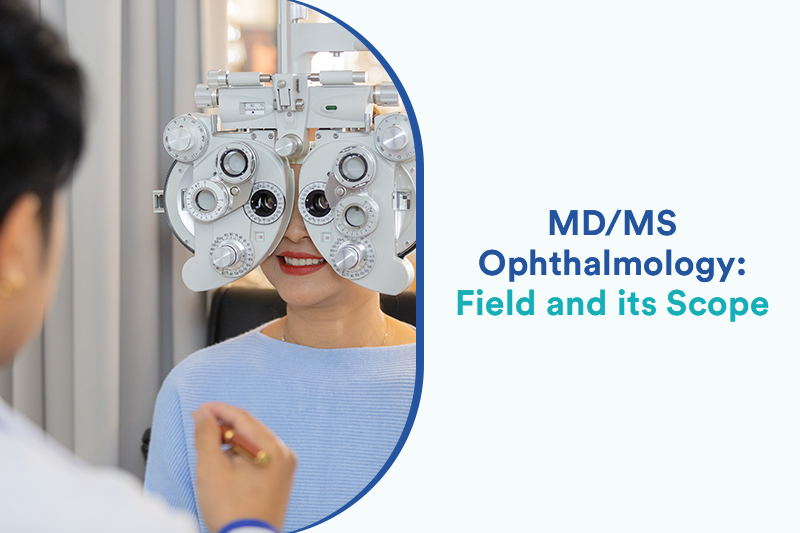The postgraduate degree (MD/MS) in Ophthalmology is a three-year full-time degree to be pursued after completing MBBS. The course focuses on providing specialized training in the treatment, diagnosis, and prevention of eye diseases. Admission to this course is done through the NEET-PG entrance examination, conducted by the National Board of Examinations. The goal of postgraduate education is to produce professionals who will deliver top-notch medical care and advance science via teaching & research.
During the PG course training, the postgraduate student pursuing MD/MS in Ophthalmology receives instruction in regional anaesthetic blocks, pre-medication, and case preparation for operations in the first phase. The postgraduate student helps the operating surgeon during the surgeries at the next stage. In the third stage, the graduate student works on their own with the help of a more experienced graduate student or a faculty member. She or he must possess certain skills and demonstrate acquaintance with others.
Ophthalmology as a Profession
Ophthalmologists are medically trained doctors who use cutting-edge technology, medication, and surgery to treat and diagnose eye disorders. As an ophthalmologist, a medico becomes an expert in the diagnosis, management, treatment, and prevention of illnesses of the eye and visual system. Ophthalmologists deal with a variety of ailments, such as glaucoma, cataracts, squints, eye traumas, infectious eye infections, and age-related degenerative problems. Medical Professionals take care of patients with acute and chronic eye diseases of all ages, including preterm infants and the elderly. M.D.s have the specialized training to offer the complete range of eye care, from dispensing contact lenses and spectacles to performing intricate and delicate eye surgery.
Courses to Pursue a Career in Ophthalmology
- MBBS (undergraduate degree)
- Diploma in Ophthalmology (DO)
- Diplomate of National Board- Ophthalmology (DNB)
- MD/MS in Ophthalmology
- Postgraduate Diploma in Ophthalmology
- Postgraduate Certificate program in Clinical Ophthalmology
Qualifications required to practice Ophthalmology
The following qualifications and skills must be possessed by an ophthalmology postgraduate:
- Fundamental understanding of ophthalmology-related human anatomy, physiology, and development, as well as the variables that might upset these pathways and the resulting structural and functional problems.
- Knowledge of how to handle neuro-ophthalmology issues before referring the relevant cases to neurology and neurosurgery.
- Strong knowledge over examine, diagnosis, treatment and awareness for the following topics: lens, glaucoma, cornea, pediatric ophthalmology, oculoplasty, uvea, retina and genetic issues in ophthalmology.
- To show proficiency in the prescription and dispensing of contact lenses and ocular prosthetics, as well as knowledge of contact lens manufacturing.
- Be able to work as a team, cultivate a cooperative attitude among co-workers, and communicate with patients, clinicians, and other co-workers to offer the best diagnosis or opinion.
- Always uphold ethical values, maintain an appropriate demeanour in interactions with patients, family members, and other medical professionals, and respect the patient’s rights, including access to information and a second opinion.
- Develop communication skills for successful teaching, writing reports, and professional opinions, interacting with patients, family members, peers, and paramedical personnel, and more.
Scope and Salary of Ophthalmologist
On average, the salary of an ophthalmologist after completing their postgraduation degree is around Rs. 12 lakhs in the beginning. The field is highly rewarding, and packages are found to be quite lucrative with experience.
After completing coursework in this area, career prospects can be found in a variety of settings, including hospitals administered by the public or private sectors, clinics, healthcare facilities, NGOs, missionary and charitable hospitals, and many more.
As qualified and knowledgeable ophthalmologists, you can open your clinic. Additionally, several schools and universities may choose to hire you as a professor or lecturer. You can join as an ophthalmologist in the Army, Air Force, or Navy.
Job Profiles:
- Ophthalmologists
- Medical Consultant
- Clinical Researcher
- Ophthalmic Surgeon
- Professor/Lecturer
- Clinical Research Associate
- Neuro-ophthalmologists
- Cataract Specialist
- Lasik Surgeon
- Pediatric Ophthalmologist
- Ocular Immunology Specialist
- Oculoplastics Specialist
By subscribing to the Ophthalmology MD course, you get to learn through highly illustrative video lectures by eminent faculty and get access to notes, and self-assessment questions. The course components match all the learning requirements of the PG students. You learn with case demonstration videos, 3D surgical videos, clinical cases, and a lot more.





